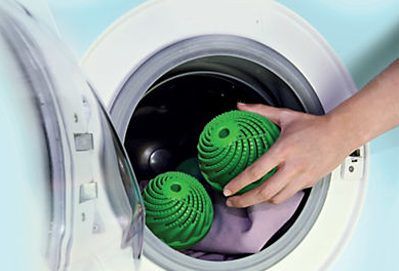“Green laundry” no longer concerns what occurs to your whites when you launder them with colors. Nowadays, green laundry stands for eco-friendly laundering practices that emphasize biodegradability and less waste.
For natural laundry, a few popular choices include soap nuts, dryer balls and eco balls. If you have never took heed of these things, read on – they’re part of all-natural, green laundry. And for those who endure chemical allergic reactions or sensitivities, these natural choices may be a genuine boon.
Soap Nuts
Soap nuts are genuine nuts or fruits from the Chinese Soapberry Tree (Sapindus mukorossi), which grows in the mountains of India and Nepal. They might be a fresh concept for westerners, but these soapy nuts have been utilized to wash fabrics for generations of local folks.
Once the seeds are removed from their shells and dehydrated in the sunlight, the soap nuts are prepared to use in your laundry. For modern washers, soap nuts come packaged in a fabric bag. You place the nuts into this bag, tie it closed, and chuck the bag into your automatic washer. They may be utilized for several more loads before you need to replace them with new nuts. The used nuts may be discarded into your compost pile.
Dryer Balls
These specially-designed, rubber balls feature rubber bumps all over them. They’re supposed to take the place of fabric softener and/or dryer sheets, and to decrease drying time. The bumps on the balls’ surface help to divide fabrics, keeping them from balling up into a mass in the dryer which lengthens drying time. (If you’ve ever had to unwind a ball of bedding in the dryer only to find it still wet in the middle, you know how invaluable keeping cloth separate in the dryer can be.)
A lot of folks prefer dryer balls to conventional fabric softeners and dryer sheets because they don’t contain aromas and chemicals. Decreased drying time economizes energy, and less chemicals in your laundry make dryer balls part of a green laundry.
Eco Balls
Occasionally called laundry balls or wash balls, eco balls capitalize on the cleaning power of water to wash your clothing. The secret is in the design and materials – the clay-based balls are housed in a permeable plastic cover. The balls react with the movement of the washing machine agitator and the water itself to create an ionization cleaning process.
Eco balls are utilized rather than liquid or powder laundry detergent, and are supposed to last anywhere from sixty to one hundred twenty loads. However, the plastic portion of the eco balls will need to be recycled once you are finished with them.


 Fill out the form below to sign up to our free natural health and healing newsletter and stay up to date on our latest articles about holistic healing therapies and effective home remedies for common ailments. As a thank you for joining our newsletter, we’ll also send you
Fill out the form below to sign up to our free natural health and healing newsletter and stay up to date on our latest articles about holistic healing therapies and effective home remedies for common ailments. As a thank you for joining our newsletter, we’ll also send you